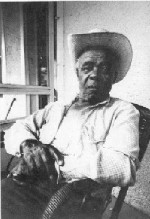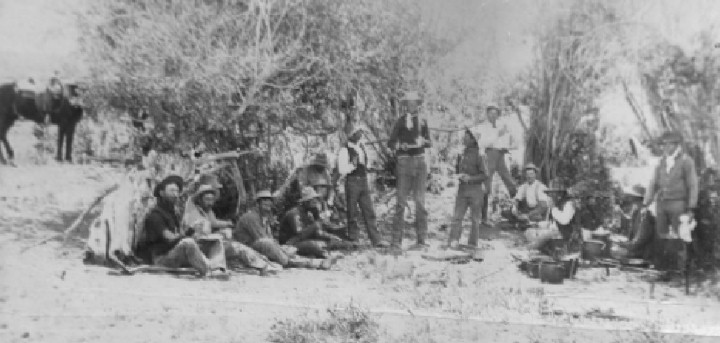HOWARD
HICKSON'S HISTORIES
[Index]
Black Wrangler - Part Four
Reminiscences of Lawrence Jackson
Edited by Howard Hickson
 Photograph
of Lawrence Jackson by Jonas Dovydenas, Lenox, Massachusetts. With
his permission. Photograph
of Lawrence Jackson by Jonas Dovydenas, Lenox, Massachusetts. With
his permission.
JACK COOLEY
One spring a young man came to camp. Said his
name was Jack Cooley, from around Seattle. He never mentioned his parents
but did say that an aunt and uncle raised him. He didn't know much about
horses, but said he wanted to learn. We all like him. He was a good kid,
but as wild as that March Hare, whatever that is. He would dare almost
anything, man or horse.
He went to Elko and got drunk. He said he
didn't know what happened, but the police found him, unconscious, in an
alley. Beat up and robbed. His shoulder was dislocated, an arm broke, and
some cracked ribs. Looked to me like he had been kicked some.
All ranchers have workmen's compensation,
but Jack had gone to town and that is off the job. Some people say cowboys
is a rough lot and, maybe in some ways, we are. A big half-breed in camp
named Frank was always griping and complaining. He was the last person
I ever expected to get sympathy from.
He said, "Talking don't pay doctor and hospital
bills. That boy needs help and it's up to us."
He always wore a big black hat. He took it
off, put his hand in his pocket and got a handful of loose change, then
added a bill from his wallet.
"That's all I got. Shell out, boys, our friend
needs help. Who knows? It might be one of us next time."
We all put in something. Three other outfits
was close by that didn't even know Jack, but they helped out. We soon had
enough to pay his bills and buy a Pullman ticket for Seattle.

Spanish Ranch hands in camp. That's Shorty Johnson in
the dark shirt near the center. He was seven feet tall.
Photo from the Northeastern Nevada Museum, Elko.
LONNIE MURREY
When we was at Dry Creek getting ready to start running
wild horses, we hired four new cowhands. One was a Negro boy named Lonnie
Murrey. He was another sad case. Lonnie was a quiet type, never had much
to say. He seemed to have something on his mind that was bothering him.
One day he got drunk and told me what it was all about.
He said he was from Texarkana, Texas. He was
a small man and had been a jockey. He was doing all right until he got
mixed up with some bigshot gamblers and took a bribe to throw a race. He
was banished from the tracks for life. What hurt him the most was that
his wife got a divorce and her folks wouldn't let Lonnie see his little
son.
He was a top hand, but got drunk ever chance
he got. When he was drunk he had a sad song he sang..."I got a woman and
a bulldog too, my woman don't love me but my bulldog do." The other cowboys
used to laugh at him, but I didn't. I knowed his story and knowed he was
hurting real bad. He took to drinking more and more, then went to work
for a small outfit that hired one man.
One day his old dog came down to the ranch
where we was and barked and howled. He would leave, then come back again.
Nobody paid any attention, just said Lonnie must be on a drunk again. The
cook thought something must be wrong, so she followed the dog back to camp
and he led her to the corral. There was Lonnie. Dead. He had been dead
two or three days. His horse was still saddled and standing by. We don't
know what happened, but Lonnie told me, once, that a doctor had told him
to stop drinking because he had a bad heart.
GEORGE RICE
We once had a cowboy that was a mean and treacherous
old guy named George Rice. He and some other fellow had been fussing and
quarreling all summer. They wound up in a fight. George pulled a knife,
but the other fellow had a gun and pistol-whipped George and run him off,
but he came back and waited his chance.
We was driving cattle and George got behind
the guy with a rope. Someone hollered to the fellow to look out, but it
was too late. George roped him and jerked him off his horse. He dragged
him a ways out and back again.
George pulled up in front of the boss, George
"Cockey" Gilbert, and said, "Here's your tough man. He won't hurt anybody
now."
He then rode off. Nobody seemed to care, one
way or the other, as they both was considered undesirable. George stayed
away a year or more, then come back to work again as if nothing had happened.
Nobody asked him any questions. I worked with him all one summer and fall.
I never bothered him because I knowed how he could fly off the handle and
start an argument for no reason at all.
MOVING CAMP
Gorham's winter headquarters was at Star Valley,
near the Idaho and Nevada boundary line. Some maps showed it in Idaho,
others in Nevada, and some didn't show it all. When we finished up at Dry
Creek, we moved everything to the valley. That's no problem for a bunch
of saddle horses, but it's a job for a team with a heavy wagon. I had to
drive the team. Most cooks drove their own wagon, but our Chinaman cook
couldn't, so I had the job.
Whenever we moved horses Gorham stayed way
back out of the dust because of his sinusitis. When we got to the valley
the buckaroos was holding all the horses outside the corral. Gorham finally
rode up and asked what was going on.
SQUATTERS
One of the hands, Fred Lee, said that the DeWire
brothers had taken possession after filing a homestead and wouldn't let
them use the corral. Gorham carried a Smith and Wesson .44 under his left
wing. He pulled it out, checked to see if it was loaded, and stuck it in
his waistband where it would be handy.
"You boys stay here. I'll handle this."
Bill DeWire yelled, "This is our property.
We filed on it legally and the proof is in Carson City, on record."
Gorham told him, "Your claim is worthless.
I just came from Boise where I looked up government records and maps. This
place is in Idaho. If you care to look, I have the proof right here. You
boys have a move coming."
Some of us thought it was a bluff. But it
worked.
Bill said, "Okay, we will move in the morning."
"No," Gorham said, "You move out now. There
is plenty of daylight, so get your horses out of my corral before I run
them off."
They was gone before dark.
NAPOLEON, THE MULE
Later, we was camped in Twin Valley Waterhole,
running mustangs. When we got ready to move, the bell mare dropped a mule
colt. Since we was running to Dry Creek, 35 miles away, we knew the colt
wouldn't make it, so we loaded him into a wagon.
When we got to Dry Creek the mare wouldn't
claim him. Gorham was all for killing it since the colt couldn't survive
on his own, but the Chinese cook, Lem Foo, had been feeding him real thin
oatmeal and he seemed to thrive on it. I named him Napoleon. We all liked
him at first, but he got to be a pest. Somebody had to watch camp all the
time to keep him from destroying it. He liked to chew on saddle latigoes
and bridle reins. A lot of things a man don't need is a pet mule.
Next: Jackson recalls the 1900 Winnemucca bank robbery,
an escaped convict, cattle reps, John G. Taylor's outfit, and other ranches.
©Copyright 2000 by Howard Hickson. If any portion
or all of this article is used or quoted proper credit must be given to
the author.
[Back to Hickson's Histories Index]
|
 Photograph
of Lawrence Jackson by Jonas Dovydenas, Lenox, Massachusetts. With
his permission.
Photograph
of Lawrence Jackson by Jonas Dovydenas, Lenox, Massachusetts. With
his permission.
